#are we reading the same book this WHOLE THING is about god! and humanity and our fallen nature and how this breaks relationships!
Text
The worst part about reading in a genre where you have low expectations (in this case, Christian historical fiction) is that when a book impresses you, you have no idea if it's actually good or if you're just overly impressed because it was a fraction of a degree better than the usual garbage.
#basically lately anytime i read a christian fiction book that isn't romance-based i find myself surprised by the quality#i do think that some christian publishers are getting better#and trying to tell stories that dig deeper into real faith and messy issues#instead of making only vapid squeaky clean prayer-filled tropefests#but i'm not sure *how much* better#because anything above the low bar feels like great literature#the most recent is 'in a far-off land' by stephanie landsem#and let me tell you setting the prodigal son in 1930s hollywood is a genius concept#i have some issues with the history and the mystery#but the characters!#it has been a long time since i cried this hard over a book#several chapters of solid waterworks#(and i also have the issue of figuring out if it's actually that moving or if i'm just hormonal/sleep-deprived)#i keep thinking about this book but also i worry about recommending because what if it's actually terrible by normal book standards?#(also the author DOES NOT understand the seal of confession and i was SHOCKED to find that she's actually catholic)#but also looking at the reviews makes it clear that if most of christian fiction is vapid garbage it's these reviewers' fault#here you have something that's digging into sin and darkness and justice and mercy and these people are just#'how can it call itself christian fiction if it only mentions god at the end?'#are we reading the same book this WHOLE THING is about god! and humanity and our fallen nature and how this breaks relationships!#your pearl-clutching anytime someone tries to get even a tiny bit realistic is destroying this genre#i'm gonna run out of tags so i'll stop now
57 notes
·
View notes
Text
some undifferentiated thoughts about my Starfield playthrough as i have them. i am a game developer with a strong interest in procedural generation and i've enjoyed a bunch of other bethesda games so this might get pretty mean sorry
(this is a long one)
starfield dialogue is already exhausting me "oh you must've been living under a moon rock ;)" get it! because they're in space! this would've been too corny for the Jetsons
there's a kind of cheap dusting of space theme over everything. the food isn't salmon but alien salmon. it's not seaweed but alien seaweed. cooking alien stir-fry. come on
cannot get over how clumsily the theming is handled. books, board games, weapon names revolve heavily around space. these people have been living on alien planets for hundreds of years yet have this unending sense of novelty about it. the game takes itself completely seriously but feels like it's attempting to parody itself
people's EYEBALLS are CLIPPING THROUGH THEIR EYELIDS
a woman is speaking to me in french. her accent is about as believable as her haircut
these are some of the worst reflection maps i've ever seen
next to nothing is interactive. you can sit in chairs and sleep in beds and that is about it. can't even drink from people's toilets. disgraceful
game helpfully crashes 5 seconds after i decide i should get some sleep. very handy!
my character has not said a single thing since i started playing. not one peep. this is an unmitigated improvement over Fallout 4 i'm so glad honestly
the more i poke around the big city the more the NPC quips feel like something out of gen-1 pokemon. can't get enough of this coffee :) this city is where it's at :) spacesuits are comfy and easy to wear
very strange sense of altered reality from the quest dialogue too. has anyone at bethesda met a person before? i move on to some mission that has me scanning wildlife on a faraway planet hoping this will, somehow, feel less alien than human conversation
just as with No Man's Sky, every planet is uniformly dotted with equidistantly-placed points of interest that you slowly make your way to (no vehicles besides your jetpack) which always turn out to be some cave or building identical to those you've cleared before
unlike with No Man's Sky, the seamless exploration is faked and the biodiversity is nil. you do get an impressive amount of raw loading screens however
the prefab bases and power stations found everywhere on planets seem to have very sparse, very specific slots for spawning consumables, which results in encountering some giant industrial installation in the middle of nowhere with, i don't know, a loaf of whole-grain sandwich bread just casually sitting next to it all proper. there is no breathable atmosphere here. who is eating this
planetary traversal is a CHORE. i am saying this as someone who loved Death Stranding
heinous "hold to confirm" buttons sprinkled in various flow-breaking places throughout the interface
enemy AI is abominable. nobody is pathing their way to get my ass. "must've been the wind" taken to the next level. an infant playing peekaboo has more object permanence
hoisting yourself up on ledges when jumping is…nice
companions randomly nowhere to be found. persists through multiple fast-travels and loading screens until, just as randomly, they pop back up
storage space is now limited! unlike in Fallout 4 and virtually every other bethesda game, your containers now hold a finite item capacity. god forbid we let the player have fun
baffling inventory UI. i imagine there's a mod out there that completely overhauls it the way SkyUI did for Skyrim. this should not be needed! how are your UIs getting worse a decade later!
scanning the precious few species inhabiting some dusty planet; one of them is this arching red root i've already seen several times before. my job done in this biome, i travel (read: teleport with a loading screen) to the polar region to find some other species. the first one i catalogue is the exact same red root again but this time it's named "boreas root" todd howard is a genius
some alien horror comes at me full fangs out. i hop on a pebble. obscenely, i am safe
procedural terrain generation beyond dull, impossibly unimaginative. these people have not had one critical thought on what makes a procedural world interesting. beginning to feel validated in my belief that only i should be trusted with proc gen. along with perhaps tarn adams
jokes aside this is making me feel genuinely insane. there have been excellent procedural generation techniques that produce compelling explorable maps for decades now. bethesda absolutely has the budget and know-how to do miles better than this yet somehow they just…do not? the same way Pokemon has decided to just no longer bother with their mainline games despite being the highest-grossing media franchise in history? hello? what is for real going on
some of the most cynical breadcrumbing i've seen in years. approaching some random cave and this person in space gear, who in the vast immensity of the infinite cosmos just happens to be snapping pictures right here, tells me more-or-less verbatim "if you like this place, you should see this other place" [other random cave has been added to your map.]
i do not like how good this makes No Man's Sky's gameplay look. it depresses me how much i have to hand it to No Man's Sky for at least not fucking up this bad. please stop making me wish i was playing No Man's Sky instead this is grotesque
i think i've exhausted my interest and patience for this game at the moment. i'll get back to the main story at some point and try some other systems ie. crafting and base-building to see if there's any engagement to be found but so far, my god. my god
1K notes
·
View notes
Text
TGCF author's notes translation
@/camilikha on twitter kindly provided links to TGCF author's notes and I translated the ones I find informative and interesting. See translations below:
chapter 58 notes: The second book is all about the overconfident Xie Lian with delusions of grandeur and the tender little flower (mxtx means kid Hua Cheng) and their diaries of the downfall of Xianle. Word count is undecided, I'm never accurate at estimating word counts anyway. It's just like the xianxia I write doesn't fit into your regular xianxia, the royalty I write doesn't fit into your regular fictional depictions of royalty - just the outlandish made-up worlds and social customs in the author's imagination...
chapter 60 notes: If we put Qi Rong in a modern context, we could say that he has bipolar disorder.
chapter 72 notes: about the chapter title "To Meet You in the Mortal Realm; to Find Flowers Beneath the Rain" - eventually I feel that "To Meet You" is more romantic than "To Meet Someone". Just think about it, "meeting you" is one of the most romantic things in the world.
chapte 80 notes: Of course (HC) won't give (XL) a handjob or help him [...], but Huahua's sexual awakening starts with this incident... (XL is seriously obssessed with martial arts combat!)
chapter 88 notes: Xie Lian never gets tanned, I envy him... I finally reached this place - in a dilapidated temple, a god about to be forgotten and a believer who's still young - this is the first mental image I have about this story, which drove me to wrote the story. I'm the kind of person who'd make up a whole book just to get to write a certain passage...
chapter 119 notes: Actually Huahua is just being naughty and wants to joke around playing dead, who'd have thought...
chapter 123 notes: So Black Water made his appearance long ago, he's been hanging around before your eyes all along. Wind Master never knew the real Mingyi, it's always been the same person before him - and before you readers. (Black Water) officially recognized as Best Actor of this story! I've been holding it a secret for so long and so has he, now I can finally let it out.
chapter 141 notes: If you heat up Huahua in the kiln, he'll grow bigger~
chapter 175 notes: "Hua Cheng! Your diary! We've read it all!!!"
chapter 229 notes: Huahua low-key sucking up to the elderly to make a good impression
chapter 242 notes: Why do you like to spook yourselves? - why on earth would there be such plots as (XL) waiting for another 800 years - too long, impossible! Happy ending is around the corner!
SVSSS is my first work so it has some exceptions that I won't discuss here, but MDZS and TGCF both only have one main couple. I said this repeatedly in the author's notes when MDZS was being serialized and in other places. As for Mo Xuanyu, he is a little gay dude but he died at the beginning of the story so he doesn't count as a serious character...It's fine to have headcanons you like as long as you don't seperate the main couple. But for me personally, my taste leans towards having only one gay couple in the story, and I have no plans to write about another secondary couple. I'm stating this to avoid some unnecessary disputes.
XL is good at making pickled vegetables. Because pickled vegetables are needed with steamed bun and rice porridge, so XL became quite experienced after practicing for hundreds of years. Also you can just leave the pickled vegetable by itself most of the time and let it undergo chemical reaction. XL mostly fail because he get inventive.
XL and Mu Qing chose the same path of cultivation and are both Daoists. But Feng Xin never studied under a master at the Holy Royal Pavillion so he's not a Daoist and simply a plebeian martial god, so he doesn't need to observe the celibacy rules like XL and Mu Qing.
My passion for inventing new dishes (or rather weapons) cooked by Xie Lian is only slightly less than my passion for making Huahua change into new clothes
Huahua often turn into human forms, in which he has two eyes, so you guys can stop counting the number of his eyes.
In the setting of this story, if you want to be a god,you need to be a human hero first, which means you need to be the best of the best among humans. Only heaven officials who ascended are real heaven officials and belong in the Upper Court. How do you ascend? Firstly it depends on your personal ability, you have to be outstanding in some aspect (such as martial arts or literary talents) to enter the path of ascension. Secondly it depends on luck, if you're extremely lucky and a favourite of fate, and just picked up some rare secret guides (to ascension) or immortal pills by the roadside, that works too. Officials in the Middle Court are appointed, which means someone in the Heavenly Realm could promote you to that position. But Middle Court officials have the opportunity to become a bona fide Upper Court official too if they're capable enough.
Black Water indeed owes Hua Cheng a huge sum of money and is a very impoverished Calamity, seriously lowering the income standard of the Calamities (although there're only three of them). But his debt isn't completely due to eating too much. As for the money Black Water owes, it's an ancient debt - 40% is the cost of buying gifts for heaven officials of Upper Court and planting agents there (bribery!), 30% is maintenance fee for his territory and expenses on pet food, the rest 30% is food (for himself).
Talismans are probably the equivalent of the business cards (of heaven officials)... "Hello this is my consecrated talisman" = "hello this is my business card"
You can't get rid of ghostly essence (which XL is tainted with because he spends too much time with HC) simply by brushing your teeth with plain water...you need to use consecrated spell water (which is super bitter and weird).
The weapon forged by a heaven official is called fabao (literally "dharma treasure"); if it's a weapon forged by mortal Daoists and monks, it's called faqi (literally "dharma tool") - only after their ascension can their weapons be called fabao.
In my imagination, Xianle ia the kind of small ancient kingdom that's overall culturally Han, but has peculiar customs...although I feel like what I wrote on Xianle is mostly just peculiar hahahaha [facepalm] [beat myself up]
Not only are the forms, customs, cultures, and politics of countries in this story made-up, the kind of arcane stuff like occult sciences and philosophical values are all made-up. Although I did research but the records I consulted are too difficult to understand, so I just made things up on my own. Please bear with me If you're knowledgable in this sort of thing hahaha.
Puqi refers to water chestnut.
Look up "Blood-Soaked Fire Social" (xue she huo) if you're interested, it exists in real life and is very thrilling. What I wrote is different from the traditional festival, there're some made-up elements to make it more exciting
211 notes
·
View notes
Text
favourites - platonic!crowley x reader
gender non-specific, reader is a uni student, crowley is a father figure, implied platonic!aziraphale x reader
a/n: back from my hiatus to post this. it's been sitting in my drafts for a while. hope you like it!! <3
word count: 767

You thought it'd be nice to surprise Aziraphale and Crowley and come home during the break. However, you hadn't imagined they'd be in the middle of another… unearthly situation.
Turns out the two of them have been harbouring the Archangel Gabriel, whom you had only met once. And whom the last you heard of was when he tried to kill Aziraphale.
But, love thy neighbour, you suppose.
On your way home, you thought it peculiar that the streets were wet despite the forecast predicting no rain. However, the weather is known for its unpredictability, so you shrugged it off.
When you arrived at the bookshop, you were met with a grumpy-looking Crowley who, to your credit, did look surprised to see you. He explained that Aziraphale, against his own wishes, had taken the Bentley to Edinburgh. And he ignored your comment about how he never lets you drive his car.
So, you stayed at the bookshop with Crowley. You caught a glimpse of your room upstairs. Your bed, your desk, even the chair Aziraphale insisted on having so he could read to you was still there, despite you telling him that you were too old for bedtime stories. Everything was in the exact same place you left it.
Except now, Aziraphale's copious amounts of books have taken up storage like stalagmites in a cave. And there was a strange, large man occupying your space. You decide to take refuge downstairs.
To pass the time, Crowley tells you about Job as you look through the book that Aziraphale had left out. He tells you about God's plan to test the faith of their favourite human, how he had free reign to ruin Job's life but ultimately didn't.
Crowley was always nice, you thought.
After hearing the story, you say, "It's a bit overly righteous."
"Well, we are talking about God," Crowley replies.
"Yeah, I know, but there must have been a better way." You try to think of an analogy. "What if I said, 'Oh Crowley, you're my favourite dad, but maybe you only like me because you have to'. And then I crash your car and set your plants on fire and… punch Aziraphale in the face to see if you'll still like me afterwards."
Crowley stares at you with subtle incredulity. You sense that he's about to say something judgemental.
But instead, he asks, "I'm your favourite?"
"What?" you reply.
"You just said I'm your favourite."
"…I was just trying to make a point."
"Oh, so Aziraphale's your favourite?"
"Who said I had a favourite?"
"Come on, everyone has a favourite parent."
"Well, I don't."
Crowley stares at you even more, waiting for you to break. But you seem successful in holding your ground.
"Alright, whatever," he gives in. "And I do like you, by the way. Not just because I have to."
"Hah, I knew it," you give him a big smile.
"Just don't crash my car or do any of what you just said."
"I wouldn't dream of it."
He smirks back and continues, "I agree with you about the whole Job situation, too. So does Aziraphale. That was the first day the two of us were truly on the same side."
"Our side," you say.
"Exactly," Crowley nods, "Though we hadn't realised it at the time."
You watch as Crowley smiles to himself. It reminds you of the nights in your room when Aziraphale would abandon whatever book he had picked and tell you a story of him and Crowley instead.
You find yourself smiling too.
But a crash from upstairs ruins the moment. It's Gabriel, or rather, Jim.
You sigh and ask, "Did Aziraphale have to give him my room?"
"No, but I suppose he wanted Gabriel to be comfortable for whatever reason," Crowley shrugs.
"What if he's touching my stuff or something?"
"He probably is. Might be breaking a few of your things, too."
You cringe at the thought. "Would it really hurt you to try and make me feel better?"
"What, you want me to lie to you?" Crowley asks.
"You are a demon, aren't you?"
"Retired, technically."
Unable to think of something to respond with, you turn your sights to the street through the window, wondering when you'll see the Bentley return.
"Hey," Crowley grabs your attention again, "This will all be over before you know it. Then I'll let you and Aziraphale drag me to whatever dreaded place you both wish."
You aren't sure how true that is. Or how much trouble Jim will really be for them.
But for now, you just smile. "Sounds like a deal."
#good omens#good omens x reader#crowley#crowley x reader#ineffable husbands#ineffable husbands x reader#aziraphale#aziracrow#edit: realised that gif of crowley is actually aziraphale oops 🤭
97 notes
·
View notes
Note
Waiiiit tell me more about the medieval artists misconception please? 👉👈🥺
YESSS. This idea that medieval artists en masse didn't know how to draw always bothers me because really the medieval period had a mass stylistic movement that is actually really endearing and interesting.
I'm gonna shove this into a read more BC it's a lot of rambling.
About animals with human faces- often this will have been intentional. It's not that they can't draw animals- it's that the addition of humanity adds something to the piece. To those in the medieval times it was evident that we were made in the image of god and, therefore, god looked human. In that way if something was imbued with a human face it might indicate a higher knowledge or power (not always holiness but sometimes, yes.)

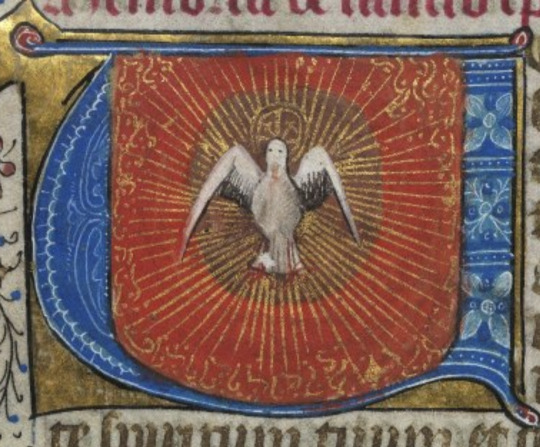
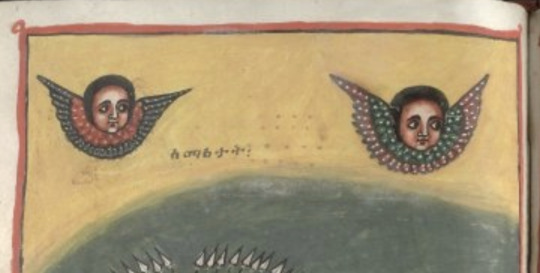
I know the first image here is a recreation from a scene in the book of revelations- I'm pretty sure it depicts Satan in some way- but I can't really be sure because the book I have didn't give an exact answer. Either way- it's a harbinger for the apocalypse in some capacity- and it's notable the way he and all his steeds bare his same face. This is clearly a piece where the human faces serve a symbolic purpose (and this doesn't exactly prove that every inclusion of a human face was symbolic but it does establish that human faces for symbolic reasons was a known visual cue in medieval art).
This being said there are instances where animals are also embellished in some way for the sake of clarifying their purpose.
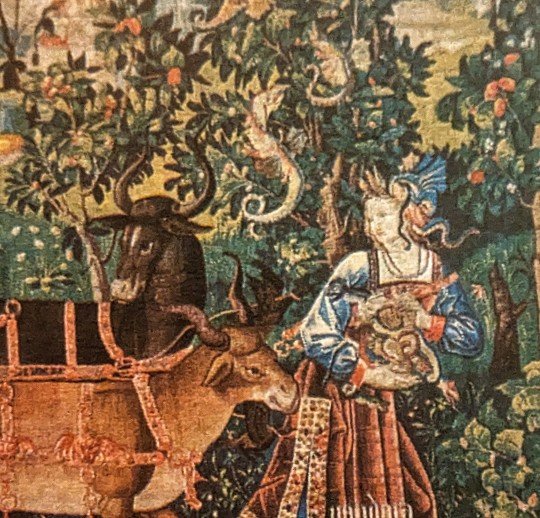
This piece includes small dragons and lizards. In the girl's hands, she holds a small monster with a human face. In this piece, the girl represents innocence, and she is letting the monsters of pandoras box escape into the world. The appearance of something being dragon-like is essentially the opposite of giving it human-like features. Dragon-like things represent evil, which could so be seen in our first example where the harbinger is sporting massive dragon wings.
These are not to say that medieval art is always accurate or purposeful- there were amateur artists then just as there are now and mistakes do and did happen. But a lot of the time if you see animals with pronounced human features (or even, an inclusion of scales where there are none in real life) it might be a use of visual shorthand for good/bad.
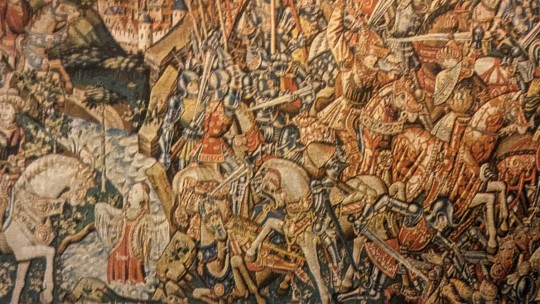



☝️ some medieval animals that I think are great. (I've seen the dog posted before as an example of medieval artists drawing human faces on animals. Be honest. That is just what little white dogs actually look like.)
There's an episode of Weird Medieval Guys where they discuss some of the reasons why medieval art has all these weird little quirks- the whole episode isn't about symbolism but they DO mention the idea that human faces in medieval art served the purpose of alluding to god.
And the University of Edinburgh has a fairly good digitised collection of manuscripts.
109 notes
·
View notes
Text
Aziraphale and Forgiveness, Pt. 3: You Think Too Much
This series is now complete! Here's where you can find the other parts.
Part 1 here.
Part 2 here.
Part 4 here.
I have been so gratified by the response to these so far! Thank you so much to everyone who has been reading and commenting and reblogging, I'm really happy that my thoughts about this are speaking to people.
Same disclaimers from before apply: this is all based on parallels to my personal experience with religion, my biblical and theological takes (when I have them) are probably sloppy, and I haven't read the GO book so this is all based solely on the show.
Aziraphale shows a level of emotional distress about Heaven's bullshit that we don't really see from the other angels. I wouldn't be surprised if some of this is because he is one of the main POV characters, and we eventually discover that he's not the only angel grappling with this stuff. But I do think he's fairly atypical. He's a demonstration of something often observed by people who leave super dogmatic religions: A system designed to keep people ignorant is extra hard on the ones who think too much.
It's a big part of what makes Aziraphale a misfit in Heaven. The archangels regularly respond to his ideas and concerns with annoyance, dismissiveness, and patronizing non-answers. When they come to Earth to confront him in season one, Uriel flat-out tells him, "You think too much." They are constantly communicating that they don't like this about him.
This aspect of Aziraphale isn't just because he's spent so much time on Earth, or with Crowley. It's clearly innate. We see it before the fall, when he tried to warn Crowley about asking questions. A different angel might have shrugged the whole conversation off and flown away, or unthinkingly blabbed about it to the wrong person later, or even deliberately snitched. But Aziraphale was already thinking independently enough of what he'd been taught to conclude (1) that this could get Crowley in trouble, and (2) that he didn't want that to happen because it wouldn't be deserved.
We also see it when he gives the sword away. Would it have occurred to most other angels to worry about Adam and Eve's survival? As they’ve been depicted so far, it seems like most of the angels—if they thought about it at all—would think, "That's not my business. It's up to God's whether they live or die." Not because they're necessarily all callous jerks, but because that's how they've been trained to (not) think about things. But Aziraphale thinks too much. That's always been who he is, he can't help it.
So what happens to a person who can't help thinking too much, who is caught up in a system that punishes that tendency? Often, you get someone who twists themself into mental and emotional knots to try to make sense of what they're experiencing.
Here’s are some things Aziraphale knows, or at least thinks he knows, in no particular order:
God created everything, is in charge of everything, and knows everything.
Aziraphale is an angel, and he works for Heaven, and Heaven’s sole purpose is to carry out God’s will.
God is good and Heaven are the good guys, so in addition to carrying out God's will his purpose is to be a force for good.
Sometimes angels who go against God’s will are kicked out and declared enemies. No one to whom this has happened to has ever come back. On the other hand, sometimes angels who go against God’s will get to go on being angels.
Sometimes humans behave wickedly and God harms or kills them as punishment. Other times, humans behave wickedly and God doesn’t do anything.
Sometimes humans behave righteously and God harms or kills them anyway (or lets Satan do it). This is apparently a test, but not all righteous people get tested like this.
Sometimes humans are sent to hell to be punished forever after their deaths. Sometimes they aren’t. This has something to do with how wicked they were during their lives, but Aziraphale isn't actually clear on how it works (see the Edinburgh minisode).
And while Good Omens hasn't delved deeply into this topic (yet), we know that both Jesus and the Second Coming are canonically real in this universe, which means the whole “Jesus died so that God could forgive people’s sins” thing is as well.* So, a few thousand years into Aziraphale's time living on Earth, God's son became a human, lived a life among humans, and then died, all for the express purpose of doing some kind of ineffable forgiveness miracle that would save more of the humans from Hell.
* I have no definite proof of this, Neil might decide to go totally off-script with the theology, but that wouldn't be in line with what he's done so far. This show has an established MO of examining existing religious stories and doctrines in order to deconstruct them. So, knowing season three is going to be about the Second Coming, I would honestly be very surprised if we didn't get some Gaiman and Pratchett style deconstruction of the crucifixion and all the forgiveness of sins stuff.
It's a complete mindfuck. He's serving a totally capricious system in which punishment vs. forgiveness is what everything hinges on, but only God knows how they are being applied, whether there's any rhyme or reason to it at all. The other angels seem content not to think about it, but Aziraphale is not most angels.
He's supposed to be protecting and guiding humanity, securing souls for Heaven, but he doesn't know exactly how the souls are judged. His best friend is a demon who is serving an eternal punishment for—something (asking questions? rebelling?)—and he has no idea if he will ever be pardoned, if such a thing even could happen or what it would take. He's committed numerous transgressions himself without ever falling, but that doesn't mean the next one won't be the thing that finally gets him cast out.
There are surely a lot of ways one could react to a situation like this. But for someone who is deeply inside the system and committed to it and whose overactive mind is working extremely hard to square all the confusion and fear of his situation with the idea that he's working for The Good Guys?
I think Aziraphale has come to live in constant fear of being Unforgiven, of one day transgressing so horribly that there's no possibility of redemption. And I think he is constantly projecting that fear onto everyone around him. It's why he lies his ass off to Heaven to cover his mistakes and broken rules. It's why he openly wishes, on multiple occasions, for Crowley to be granted forgiveness from God even though Crowley himself is visibly antagonistic to the idea. And it's why he feels compelled to forgive others even when it hurts to do so. (Like when he's just had a horrible fight with his best friend/the love of his life and he's overwrought and angry and not actually feeling forgiving at all, for example. Or when his memory-wiped ex-boss who once tried to have him executed suddenly shows up on his doorstop needing help.) Because forgiveness is such a powerful force in his world that withholding it feels like an unspeakably cruel thing to do, and he's supposed to be one of the good guys.
Once again I have written so many more words than I intended to, but I'm finally coming up on the end of this series! Part four will be the last part of this, where I look at specific instances of Aziraphale and forgiveness in more detail.
#good omens#good omens meta#good omens 2 spoilers#character analysis#aziraphale#religious indoctrination#religious trauma#forgiveness#i forgive you
94 notes
·
View notes
Text
I'm back with another unbearably homoerotic story from The New Voyages (this one even has a foreword written by Leonard Nimoy)!
The story in question is Ni Var, written by Claire Gabriel and published in the first New Voyages volume in 1976. In it, Spock is split in two - his human half and his Vulcan half. He and Kirk also have unnecessarily intense and emotionally loaded interactions pretty much every page. Just look at this passage that happens right after Spock is split:

The moment Kirk sees Spock, he knows something is wrong. They have an emotional talk that turns into an argument that turns into Kirk asking Spock what's wrong and if he can help.
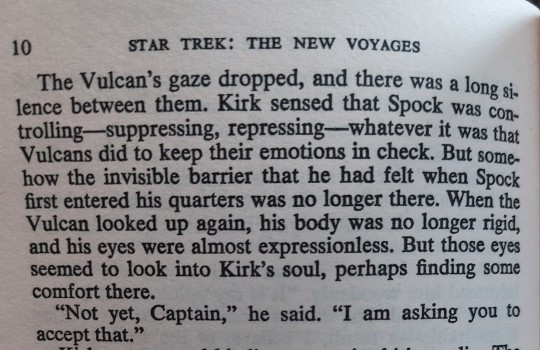
It's the way Kirk reads Spock like an open book! How Spock finds comfort in Kirk's offer to help, even if he's not ready to accept it.
And just when you think it can't get any more intense, bam - City on the Edge of Forever callback!

Kirk is having an extremely normal one.
Anyway, Kirk finds out about the split soon enough because damned if Spock can keep a single secret from him once he's determined to find out.
We are distracted from the main plot, however, as the Enterprise is sent on a mission to a planet whose natives love the taste of human flesh. Of course, Kirk insists on joining the landing party but Spock is Not Having It.
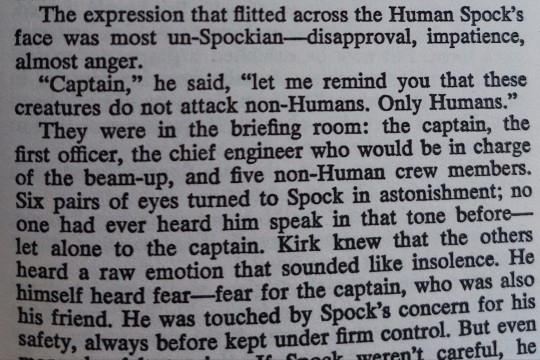
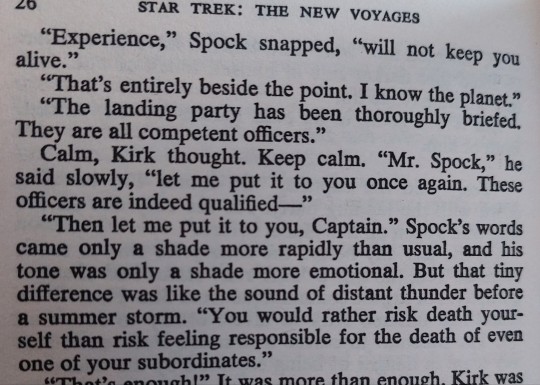
They are having this fight in front of the crew. If the rumors didn't exist before, they certainly do now.
Spock loses the argument on account of Kirk being Captain and goes back to his quarters to discuss the issue with his Vulcan half.
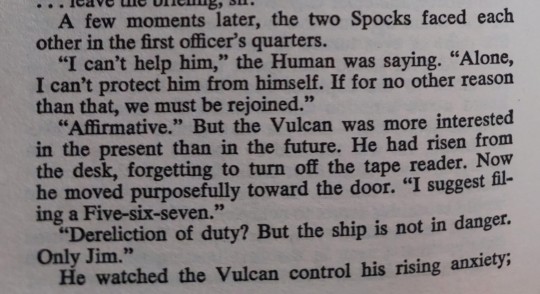
This, the text points out, is the first thing Spock's two halves are in complete agreement on. Protecting Jim. I am banging my head against the wall.
Then Vulcan Spock goes on a mental tangent about humans and emotions and one human in particular, and this passage drives me bonkers.

"Until he met Jim Kirk."
"A man for whom he felt friendship, perhaps even what Humans call love."
Clawing my eyes out. The romanticism of it all. These are completely normal thoughts to have about your commanding officer!!

And then Spock decides to risk what he calls "for a Vulcan, torture" to ensure Kirk's safety. What this whole subplot is for is essentially to show that Spock's two halves can be united and the thing they unite over..... is Jim.
I am unwell.
Spock does manage to keep Kirk from throwing himself to the proverbial wolves, the plot moves on, and then they're back in front of the machine that split Spock and can be used to unite him again. Kirk has an angsty moment about that time he was split in two (the whole story, in addition to exploring Spock's split identity, is filled with callbacks to The Enemy Within and the toll that experience took on Kirk mentally and it's great).

This isn't a particularly Kirk/Spock moment but I had to include it because I love the mental image of Kirk flipping himself off and Spock laughing at it. Kirk would fuck his clone, actually.
Then the time is at hand to unite the two Spocks. Kirk puts a comforting hand on Human Spock's shoulder but then hesitates to do the same to the Vulcan half and this whole page has me crying, screaming, throwing up, etc.
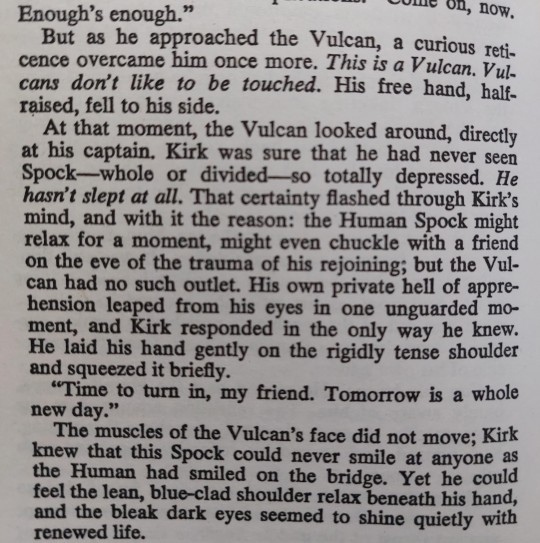
God.
Spock is united, all is well, and the story ends with Kirk grinning at Spock and Spock responding with an oh-so-subtle smile.
In conclusion: gay.
#spirk#kirk/spock#k/s#the premise#star trek tos#start trek#the new voyages#again the star trek novels stay intensely homoerotic
89 notes
·
View notes
Text
TSC has been in my greedy hands for almost 48 hours now, and I managed to read it two and a half times already.
So many things to say about it, so little words I have to be able to do that. So, first of all
1) "Neil is such an unreliable narrator" not true, but can we talk about how Jean is just as much as "unreliable", but in a very different way? In the first three books we had a boy who cared so little about anything that wasn't exy (or Andrew) that he just didn't know/notice/cared enough to even acknowledge important things. In TSC we have a boy who knows SO LITTLE about anything in the World after being isolated for such a long time, that he sees everything through a distorted lens, and even when facts are right in front of him he just doesn't get it. They are not unreliable, they were forcefully taught to focus on things different than the whole picture.
2) Jean to me is so much a mixture of kevandreil it hurts me. He went through so much and yet gained so little it hurts. He has the same desperate will to live as Neil, the same "do what you want to me but keep X out of this" as Andrew (+ a lot of traumas), he has so many mental issues only Kevin can understand and a similar attitude. This not to say he's not "original", he's a very different person from the original trio, but he just... Has all of it. He combines other's main visible issues in one single person and it just hurts to see how much he's hurting but still wants and needs to carry on.
3) Neil X Jean scene at the end hits too hard on my heart. I do not presume to know exactly what my Goddess Nora was attempting to do with that, but my mind has found multiple possibilities on why Neil did what he did, and after all the times I read AFTG (which now amount to at least 35 rereads in a span of 3 years) only one has managed to grab my heart and never leave it. So, the main ones:
- As Jean thinks, Neil took care of Grayson because he is valuable in Ichirou's eyes, so Neil felt the need to protect Jean.
- Neil is aware of what Jean went through and is human enough to care for him, now that he knows he's not just a dick, and is willing to make sure Jean feels safe.
- Neil, being the person he is and having seen what Drake did to Andrew's mind, is not going to let Grayson do the same to anyone, especially someone he knows. As someone said here on Tumblr, "Neil is not gonna let a rapist alive if he can".
As I've come to understand the characters, for the first one, not even Neil is that cold that would just care about a person if they are valuable enough to him. In the second hypothesis, Neil is not the type of guy to just care that much about someone outside the foxes lot, but it's still a realistic idea, considering what Jean did for him in TRK. Third scenario, the most realistic and authentic one to me, he's not willing to let anyone get away with forcing themselves on another, even less if it's someone he knows and can do something about it. Which is also the reason why I'm obsessed with this scene and I would pay gold to see it in Neil's pov even when I know it's not possible.
4) Last point for this useless rant, CAN WE TALK ABOUT WYMACK? I swear to god that man is my absolute nightmare (in a good way), I just can't get over how much of a saint he is with those idiotic children he cares for + Jean. I just love him so much. He is rude and raw and can't be truly nice to save his life, but he cares, he cares about them with all his soul and he's not going to leave them alone when they need a helping hand the most.
I kind of wish coach Rhemann was like him, but at the same time I don't because a) if he was he would probably be at PSU, and b) I want him to be a completely different kind of dad to his boys and girls. (but I'm still going to cry on all of his scenes because that man is just too much for me (and for Jean), understanding but not pushing, being respectful of boundaries and "This was the belligerent stare of a man who’d haul Lucas out of there by force if Jean indicated he didn’t want to be alone with him.". )
So, yeah. I'm probably going to read it a third time tonight.
#all for the game#the sunshine court#neil josten#andrew minyard#kevin day#jean moreau#david wymack#tsc spoilers#tsc
43 notes
·
View notes
Text

“And she brought forth her firstborn son, and wrapped him in swaddling clothes, and laid him in a manger; because there was no room for them in the inn.” (Luke 2:7)
No room. That’s something I’ve heard too much lately. Palestinians have been hearing that for 75 years. Since they were driven out of their homes—more than 700 000 of them—in 1948 to make room for the colony of Israel, there has been less and less room every day. Less land, literally, as even though lines and walls have been drawn over the years, Israel continues to illegally settle in Palestinian land. Less room to breathe, as the population of Gaza grew within the illegal blockade walling them into a tiny strip of land. Less room to live now, as Gaza has been under constant attack by Israeli bombs and guns and while the civilians of Gaza are pushed by this violence into even smaller and smaller “safe zones” (though there is nowhere safe in Gaza right now).
But also no room our conversations. No room in our imagination. No room in our understanding of our world of “human rights” and “developed nations.” You’d think “Palestinian” is a slur for how quickly it shuts up (or heats up) dialogue. These are our neighbours, and it feels like pulling teeth to get people to engage with their humanity—let alone ask their MP to ask our government to ask Israel’s government to please stop bombing civilians for the third month straight.
Today we recognize when a Jewish Palestinian family was forced by the state to leave their home, shelter in unfit terrain, give birth without proper medical care, survive a massacre, and become refugees. We Christians call the baby born in that family Emmanuel, which means God with us. God was born in Bethlehem, behind the border wall, in an occupation. What does that tell us about who God is?
Our Christian siblings in Palestine have asked us not to let this Christmas pass as usual. To that, I ask, what is Christmas as usual? If we don’t see our neighbours in the story of Jesus, what is the point? If we need to put the real, genuine injustices of the world out of our mind so that we can be comforted by Christmas, we are frankly doing it wrong. The point—the whole point—is that love and justice are possible for the unloved and the oppressed, even when it doesn’t feel that way. It is our responsibility to make that happen, and we can’t do that with our eyes closed.
You should feel uncomfortable about celebrating Christmas while a genocide is going on. We need to have room for that. We also need to have room for the hope that Christmas represents. We need to have room in our hearts for justice, lasting peace, and a free Palestine, because we are all needed to make it a reality.
And for God’s sake, CEASEFIRE NOW!
“He has brought down the mighty from their thrones/ and exalted those of humble estate;/ he has filled the hungry with good things,/ and the rich he has sent away empty.” (Luke 1:52-53)
.
.
.
I am indebted to Rev. Munther Isaac for his wisdom in helping so many of us walk through this time. Personally, I just finished his book “The Other Side of the Wall”—if you are a Christian, you have to read this book. I’ll buy you a copy if you want.
I also want to note that this post isn’t really supposed to be an explainer or an argument. I didn’t cite anything here, but if you’re curious about anything I referenced (e.g. why did I bring up medical care?), send me a message and I’d be happy to give you more details about what’s happening in Palestine. I’m no expert, but I know some people just genuinely don’t know the extent of the injustice and don’t know where to learn more; if you have questions I’m happy to help, but I’m not here to fight with you.
Same deal if you want to help but don’t know how. I’m happy to give you some ideas and even help you out with them (distance permitting). One important action you can always take is contacting your Member of Parliament. You don’t have to write anything fancy—just tell them honestly how you’re feeling and ask them to support an urgent ceasefire. This is literally your right as a Canadian, so you don’t have to worry about doing something wrong.
56 notes
·
View notes
Note
Hello!! I was just wondering about something...we don't really have a understanding of Elvis' personality, yeah we have books, videos and articles about the people they were around him but I'm talking about REALLY getting a hold of what personality he had is what's been circling my mind lately.
I don't know why, I've been really interested in personalities recently lol specifically Elvis'😅
Hi, sweetie! Yours is a good question to keep in mind, really. I like to wonder on this topic too. I guess Elvis' personality is very difficult to summarize because of the way his actions contradicted themselves in the messages they give. He was mainly a good person, as we all know, but also incoherent and even scary at times. It's frustrating trying to describe him because nothing seems to fit well-enough to describe how intense he was.
One thing we know for sure is how dual Elvis was - and we all are, no doubt, but Elvis's duality was very prominent, very much like changing one thing into the complete opposite in no time, as if there was no middle ground, just this or that.
The way I see it, EP was like a whole universe with all it's wonders and scary truths put together at once; like white and black, the good and bad, fire and rain, light and dark, a desert weather and a harsh winter in just one little space. He could be a spontaneous, extroverted open person, very sweet, generous, peaceful, attentive, warm, easy-going, friendly, supportive, affectionate, loyal, very wise, meditative, spiritually fervent believer in God, family-oriented, just an ingenuous little boy with a soothing peaceful and loving energy that could calm the most anxious of hearts that approached him, without even meaning to, and yet at the same extent he could also be shy, a loner, mean (here and there, both in words and actions), freezing cold, selfish, a loner, unreasonable, hot-tempered, promiscuous, sly, hopeless and lost, a control freak and a reckless disturbed man with such intense energy people could be afraid of doing something that could unleash the beast in him (that's why very, very little of his friends or family were brave enough to go against any thing Elvis would say/do or with his way of thinking), and then again he would turn into something else... He would look so confident, so strong and self-assured, a very powerful entity, but around the ones he trusted just enough he still let himself be vulnerable, acting just like a baby, begging for someone to take care of him, to show him patience, understanding, to make him feel safe, to hold him and never let go.
With the little knowledge we have about EP, we could use those and many adjectives to describe his personality but we can't summarize Elvis Presley better than to simply say he was human. Elvis was "too much of everything"... overwhelming, in a good and a little bad way too. The way he was such a good person, the way through his friends, family, co-workers and fans' memories Elvis sounds like one of the best people one could ever have the pleasure of meeting in this life, his moments of irrational and hurtful actions (towards people and himself) confuses us when we try to understand what Elvis was really about. I bet it was very confusing to understand him even for his family, lovers and friends, so it wouldn't be easy for us to understand him when we not really met him in person.
The King's personality is so intriguing! That's why there's books with analysis in both scientific medical and social fields, psychologists and psychiatrists wrote after studying Elvis' behavior patterns and what they tells us about him. Much beyond the stories their friends and general acquaintances told and how they portrayed EP in those many books and interviews we read/saw over the years, I think those psychological studies are the best way to go in depth about Elvis' personality. Even so I don't believe one single book can do all the accurate, proper work on it, one of those books I can mention now is "The Inner Elvis - A Psychological Biography Of Elvis Aaron Presley" by Peter O. Whitmer Ph.D. - I haven't read the book myself because I want to finish the friends and family books, the most important ones at least, before going deeper into Elvis' personality analysis but I've read parts of it and it's interesting. I would recommend you, if you haven't yet, to read this book.
Anyhow, I think we'll never have an accurate picture of Elvis Presley as a person, friend. One: Because people in general are difficult to understand. We contradict ourselves all the time, according to the situations we face. And two: Because nobody, for the best they can be at reading people, can really tell us what goes on inside another one's heart and mind.
I guess being such a mystery is another wonder of Elvis. Another thing we can be sure of about him is that he was even not close to be a boring person.
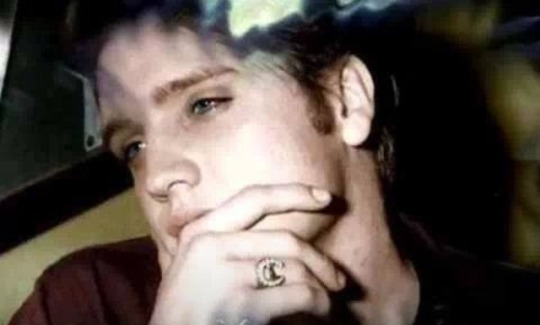
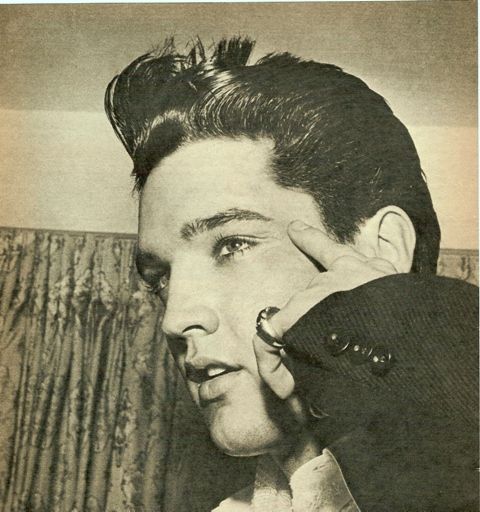
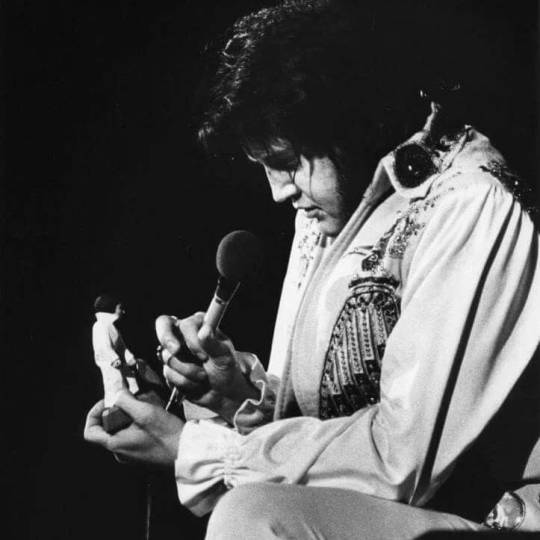
49 notes
·
View notes
Text
HAIZ EXPLAINS AMATONORMATIVITY: REDUX
it's 2014. a teenager rummages through the newspaper at breakfast. they're looking for comic strips, but instead see the headline of the sports pages, proclaiming some famous sports guy is "NOT INTERESTED IN RELATIONSHIPS RIGHT NOW."
"really?" thinks the young haiz, "that's meant to be news? the sports news??"
it's not like they'd ever read the sports pages before, but the scandal in that headline would not leave their brain zeitgeist of the day. it was a metaphorical pebble thrown at them — not the first, but the one that made them go "HEY. STOP THAT???" so they took to the keyboard to yell into the void to hey, stop that.
then the void responded.
what i wrote that day was probably one of the first posts about amatonormativity to make rounds on tumblr. i did not expect it to get thousands of notes, and it's no longer on my blog. even though the majority of the response to it was positive, i wouldn't want to bring it back, because
- it was written in a very 2014 way
- with very 2014 thoughts
- some people were really cruel to me for writing it
- i still can't read it without wincing
but:
i can write a new one.
this is not an argument about who is or isn't oppressed. that is not an argument i'm interested in entertaining, and it's not what this post is about. human life on earth is incredibly diverse and complex and i'm just here to-
OH MY GOD WHAT IS AMATONORMATIVITY ALREADY
okay so amatonormativity is like. the idea that A Lasting, Monogamous & Exclusive Romantic Relationship is the most important type of relationship in the entire world and the thing we should all strive for in our lives. (insert obligatory "the term was coined by professor elizabeth brake in the book minimizing marriage" here.)
it's not exclusively an "omg it's so hard to be aro :(" thing, because it's like, an all-encompassing Narrative foisted upon us that shapes the way we view and talk about relationships, and it does everyone a disservice (as is the case with all Normativities! we want to break 'em ALL down!! for everyone!!!!!!). nor is it intended to make people feel bad for wanting long-lasting monogamous romantic relationships! that's your personal business and i wish you well!
(it IS kind of hard to be aro in a world that constantly argues that you're lacking The Most Important Experience That Makes You Human And Life Worth Living though. not gonna lie.)
- an easy example is how the word Love is, in a Lot of instances, for a Lot of people, basically synonymous with Red Hearts Kissy Kissy Smooch Smooch. like we ALL KNOW love is more than that, we love friends and family and strangers who were nice to us that one time and our pets and our favourite foods and our favourite shows. you kind of have to clarify when you mean Love in any other way than Romantic Love. which is wild, considering how Love is such a vast emotion that covers a lot of ground, and it keeps zeroing in on this specific kind.
- related to that, i have a whole internalised powerpoint presentation about how, if you put all of your relationships with other people in a pie chart, the Romantic Partner slice is likely to be very small compared to the Family slice and Friend slice and Acquaintance slice and all these other connections you have - yet it has, comparatively, a LOT of publicity and framework that some of the other categories find themself lacking. yes, a romantic partner/s is/are someone you're likely to share a lot of time and life with, so it makes some sense for sure - but not everyone has romantic partners, or the same priorities as far as commitment goes.
- the stigmatisation of being single/unpartnered. i get the impression that a lot of people have stayed in unsatisfactory relationships because it sounds better than the Dreadful, Terrible Alternative of Not Being In A Relationship. i think there has been a lot of pushback against this particular mindset in recent years, always flaring up around valentine's day for some reason - but it still feels like it's expected to be a Temporary State, not something you'd choose or prefer.
- romance as a Humanising Component in storytelling. say you've got some sort of non-human character, such as a Robot or a Beast. what is the easiest way for them to gain Personhood in the eyes of the audience? probably by falling in love, because falling in love is the Most Human Thing There Is. i think this also extends to queer stories in a similar way - a queer romance may win over a non-queer audience in a way other queer narratives may not, an "oh they're just like us" moment, if you will. these aren't bad stories to have, and queer romances are important stories to tell! it's just... tinged with a taste of "very well.... if it's TRUE LOVE... i can find it in me to extend some compassion......."
(and! on the flipside! an easy way to dehumanise an antagonist is to be like "AND THEY DIDN'T EVEN FEEL LOVE THEY JUST HAD NO HEART THEY WERE SO INHUMAN ")
(speaking of stories you know when a series ends and they partner up all the remaining single characters in a hurry or in the epilogue because god forbid they dON'T GET PARTNERS)
- you know how the reason for legalizing same-sex marriage wasn't because marriage is THE ULTIMATE EXPRESSION TRUE LOVE, but because it comes with a lot of legal rights such as tax benefits and hospital visitation rights? and uhhhhh isn't it kind of weird that marriage is the One thing that gives u a lot of those rights and it's 1) still presented as The Ultimate Expression Of True Love And The End Goal Of Life rather than a legal contract, and 2) not available to everyone? I THINK IT'S KIND OF WEIRD.
- polyamorous relationships are also stigmatised & there's a lot of work to do when it comes to marriage & parental rights for polyamorous couples. i'm sure one could write an entire list on this topic from a polyam/relationship anarchy angle.
- the stigma against sex In General is rooted in so many things, and i believe that a huge part of breaking down amatonormativity is to destigmatize casual sex, sexual relationships that aren't romantic, sex work + sex worker rights & everything in this category. thinking about sex as a thing you can/should only do with the love of your life after you're married hasn't served us very well, i think.
- the idea that our entire life is building up to The One Important Relationship is garbage. we have a lot of relationships in our lives, many of them temporary, and all of them matter to us in some way. you are not a half looking for another half to complete you - even the most compatible person on the earth is still going to be a human person who is flawed and ever changing.
- ok so there's a thing that happens when people want to prove a gay couple is Actually Dating and not Just Gal Pals and it's like "WOULD FRIENDS EVER DO THIS???" referring to some kind of intimate moment - and it's like, i get what you're trying to prove, but... some friends Would Do That, Actually. there is no act on earth wholly exclusive to romantic relationships. i subscribe to the idea that everyone gets to decide how they define their relationships, and what boundaries they have for each kind. maybe they WILL kiss their homies on the lips. with tongue.
- queerplatonic relationships: not only did we have to create a term for a Kind of committed relationship that isn't a romantic one, but we have to fight the deluge of "but that's just dating!!!!!" and "that's just having a best friend!!!!" - the thing is, it CAN be those things if you choose to, or it can be A Secret Third Thing. the way i see it, a queerplatonic relationship is just a Framework you can apply to a relationship that's like, There, but doesn't seem to fully fit into existing categories. because the human experience is vast and weird! i think it's unfair and kinda normative to reduce it to "dating, but for aros" - an Oddly Intimate Connection That Is Hard To Categorize can befall anyone, and as i presented in my pie chart theory, we don't have a lot of framework to discuss them.
that's all i've got for today. i hope this was enlightening or affirming for some <3
#amatonormativity#aroace tag#too long for twitter#ive tried editing but i'm too sleepy to finecomb this so im just going to release it into the wilds#happy aro awareness week#long post
248 notes
·
View notes
Text

AURORA in an interview for Ticketmaster via Amroth | April 6th, 2024
In April 2022, AURORA read a letter that changed her life. It was co-written by indigenous activists, titled ‘We Are the Earth’, and called for a revolution: a collective response to global warming – to “heal the land”. They described being connected to the land “through our hearts”, and the earth as “the heart that pulsates within us.”
The letter led AURORA to consider a question: what happened to the heart? “Everything we do is about greed, about money, about mass consumption, about capitalism,” she says, blue wide-eyed and flooded with feeling. “There’s war everywhere, countries under water, flowers in Antarctica. We are ruining our land, mistreating our animals, our clothing, and each other. We have stopped leading from the heart.”
And so 27-year-old Norwegian art-pop superstar AURORA began studying books on human anatomy. She wanted to understand when and why Western culture lost touch with the deeper purpose of our most vital organ.
“The ancient Greeks thought the heart was the portal to spiritual divinity, that it represented the interconnectedness of the world,” she says. “But then Aristotle comes along and says, ‘the heart is a pump’. Then Plato says, ‘the heart makes blood’. Then another guy says, ‘the heart filters the blood’. And so bit by bit, it became purely functional. We had misinterpreted its whole meaning.”
The letter also resonated with AURORA on a more personal level. In 2022, she released her chart-topping last album, The Gods We Can Touch, which saw her complete a sold out UK headline tour, including at BST Hyde Park alongside Adele. With over a million album sales and 2.6 billion streams, and her inaugural The Gods We Can Touch book selling 14,000 copies (while signed copies sold out in less than an hour), AURORA was at her professional peak. Yet at the same time she experienced something painful that split her in two. She sensed a disconnect between her mind and heart. “It made me understand women in a way I hadn’t before. It made me understand how evil hides behind the nicest of faces.”
AURORA’s fourth album, What Happened to the Heart?, is a journey from weakness to strength, from self-destruction to self-healing. Of reuniting a fractured self. “It’s actually the most personal and cathartic album I have ever written,” she says quietly, as if the realisation had only just come to her.
‘Some Type of Skin’, a dark slice of electro-pop, reveals the conflict at the album’s core. “When you’re vulnerable, anything that brushes up against you makes you bleed,” she says. “But you need to go into battle, you need to build some type of skin.” In the song, AURORA cries: “Hit me hard where I am soft… should my heart reveal itself to be more than a muscle? Or a fist covered in blood?”
To build her armour, AURORA decided to throw herself into chaos. “Usually I am very careful, very reasonable” she says. “But for once I wanted to experience what it felt to be unreasonable. I needed to be destructive.” So she gave herself a year, while she was touring ‘The Gods We Can Touch’, to throw herself into life hard and fast. “A lot of alcohol, very little sleep, a lot of fun,” she smiles, a little wistfully. She went ice swimming and hurled things in rage rooms. “It was painful, but I was building skin.”
The chaos extended to the writing process. “I had a rule: I could only write in unsafe spaces, I needed to be rootless.” That meant no forests, where AURORA had spent much of her childhood in Bergen, Norway – a solitary safe haven away from those who made her “feel alien”. These “unsafe spaces” were loud, full of people, “strange smells, noises…anywhere where I could feel observed”.
AURORA travelled all over the word, meeting with women she describes as modern day philosophers, “women with true knowledge”. In particular, three female tribe leaders in Colombia, Brazil and Argentina. “There is wisdom in their indigenous values. These women live in the modern world just like us, but they still choose to live with kindness.”
She was inspired by their feminine power. “Men have been leading us for thousands of years and look where that has got us. We need change, and women have had everything figured out from the very beginning of time. We were the first timekeepers, we could track the seasons inside our own bodies.” She grins cheekily. “I would be scared of us too, if I were a man.”
Feminine strength inspired 'The Gods We Can Touch' – fighting against internal shame and societal judgement of the female body – and it is no less present here. Above the throbbing techno of 'Starvation', produced by German Nicolas Rebscher, who also worked on her debut EP 'Running With the Wolves', AURORA mourns the depletion of the human spirit as a result of technological invasion that is particularly threatening to women. “Our souls are starving, because AI is taking over; art is being replaced by computers,” she says, gravely. “And women, our consent, is being exploited, as it always has been, from porn to deep fakes.”
The act of mourning is integral to What Happened to the Heart? As AURORA says, “I’ve been thinking a lot about funerals, and in the music people used to deal with death”. She drew on buried grief for loved ones, as well mourning her former self.
“In Norway there is a culture of repression. I suppressed something for so long, and became infected by it,” she says, with a deep sigh. “So once I began to properly address my past, I realised that a lot of things I remembered were very different from how I imagined. And I had to accept that I have to change to move on. I am not the same as I was". She adds, firmly: "I have to learn how to work with this body, in this mind, as they are now.”
This mourning led to a kind of holy communion between AURORA's heart and mind for the first time. “I spent a lot of time drinking wine alone, speaking out loud, my heart and mind finally in conversation.” She would record these conversations and later transcribe them as fodder for her songs, such as ‘The Dark Dresses Lightly’, a haunting folkloric melody over an urgent drum pattern, which imagines the heart and the mind as two characters sitting at a table, drinking together – you can even hear the glasses clinking in the production.
AURORA leans forward conspiratorially. “So the heart says, ‘Okay, now, we've gone too long without communicating. Tonight, we're going to get drunk, go deep into this shit, and explode on each other’.” The song is the album’s turning point, AURORA adds, “when all the ugly has come out, and you can kind of hear me having an orgasm because getting everything out is so delicious, and the healing can truly begin.”
These imaginary exchanges felt so visceral to AURORA that she would sometimes paint them; the heart and mind in a sword duel, “splattering all over each other”, she says, her face lighting up with mischievous delight.
It’s a viscerality mirrored by the album’s production: a thrumming, primal force that confronts the almost ecclesiastical purity of AURORA’s own vocals. “It reflects this idea of the body falling apart, and being glued back together by something inhuman.” This discord is brought to life by “beautiful old synthesisers” that AURORA found all over the world, including with previous collaborator Tom Rowlands of The Chemical Brothers. “I got him to puke all over the song ‘My Body is Not Mine’ with his old modular synths” she says, which, fittingly, “had a mind of their own.”
Despite the thematic and sonic darkness of the album, AURORA wanted to maintain a certain playfulness. “A very random, very intuitive,” way of producing. She collaborated with some of her favourite Norwegian artists and producers, from Ane Brun on ‘My Name’, to Matias Tellez on ‘Invisible Wounds’. On some tracks she plays the drums, a fiddle player and a traditional Chinese Pipa player were brought in, and some songs contain a “beautiful mandolin from the 60s”, she says, smiling, picking up an imaginary bow as she loses herself in the memory. There is even a disco song, ‘Do You Feel?’, produced by longtime collaborator Magnus Skylstad and sure to be a club-banger and chart hit. “It makes no sense, I have no idea why it’s on the album,” AURORA laughs, like a tinkling bell. “But my sister was born in the 80s and I was kind of thinking about her. And I liked the idea of having a song that made no sense.”
Not all these songs are a product of chaos, however. The first and the last songs of the album, ‘The Echo of My Shadow’ and ‘Invisible Wounds’, were written in the quiet. “In my living room, where it was safe. They came directly from my solitude.” And with this quiet comes hope: “We both need to/Tend to the invisible wounds,” AURORA sings, a call to action for herself, to the listener, and to the world, to rupture with this malignant state of inertia, to fight back, to heal. “We need to stop this sense of global denial. We need to blow up, because it’s important, sometimes, to explode. Explosion is vital for change, to put the heart back into politics.” She smiles, and says, in the softest tone: “I think what we need... is a small riot.”
#aurora#aurora aksnes#interviews#what happened to the heart?#some type of skin#starvation#my body is not mine#The Echo of My Shadow#invisible wounds#do you feel
39 notes
·
View notes
Note
(I’m popping a extra disclaimer here because I don’t know if I worded this very well, and I understand if this isnt the kind if question you feel comfortable answering, but this is a genuine question made in good faith. I also apologise if this sounds really stupid)
I read one of your recent asks about inclusivism and it reminded me of something that always sat in the back of my mind with this train of thought.
If we say that everyone regardless of religion, or absence of it, gets into heaven, doesn’t that seem disrespectful to their faith. By saying that people of other religions get into christian heaven, is that not inadvertently telling them that their religion or their gods are fake, and that when they die it’ll be okay because they’ll learn the real truth? I hope this doesn’t come across as blunt or disrespectful to anyone, I’ve just never be able to come to a conclusion that isn’t exclusive (which is kind of a depressing thought), but is also respectful. Because it’s a beautiful idea that god loves us all regardless of who we are or what we believe, but what about people who have the kind of faith we do in a completely different god, or multiple gods, do they have the same thoughts about us? that their god loves us even though we dont believe?
I feel like I’m asking questions I’m not supposed to but I’m just really curious about your perspective if this is something you’re comfortable answering.
Hey anon, this is an important question, so thanks for asking it! You don't sound "stupid"; you're thinking like a theologian :) I'm probably not going to do it justice, I'm afraid, but maybe folks will hop on with more ideas or resources?
This got really long, so the TL;DR: I agree with you, and so do a lot of theologians and other thinkers!
In a religiously diverse world, it makes sense that people of various religions ponder where people outside their religions "fit" in their understanding of both the present world and whatever form of afterlife they have.
If someone has a firm personal belief in certain things taking place after death (from heaven to reincarnation), I don't think it's inherently wrong to imagine all kinds of people joining them in that experience, when it points to how that person recognizes the inherent holiness and value of all kinds of people, and shows that they long for continued community with & flourishing for those people.
However, this contemplation should be done with great care — especially when your religion is the dominant one in your culture; especially if your religion has a long history (and/or present) of colonialism and coerced conversions.
Ultimately, humility and openness are key! It's fine to have your own beliefs about humanity's place in this life and after death, but make yourself mindful of your own limited perspective. Accept you might be wrong in part or in whole! And be open to learning from others' ideas, and truly listening to them if they say something in your ideas has caused them or their community tangible harm.
In the rest of this post, I'll focus on a Christian perspective and keep grappling with how to consider these questions while honoring both one's personal faith and people all religions...without coming to any solid conclusions (sorry, but I don't think there's any one-size-fits-all or fully satisfying answer!).
I'll talk a bit about inclusivism and how it fails pretty miserably in this regard, and point towards religious pluralism as a possibly better (tho still imperfect) option.
And as usual I'll say I highly recommend Barbara Brown Taylor's book Holy Envy: Finding God in the Faith of Others to any Christians / cultural Christians who want to learn more about entering into mutual relationship with people of other religions.
In previous posts, I brought up the concepts of exclusivism, inclusivism, and religious pluralism without digging into their academic definitions and histories — partially because it's A Lot for a tumblr post, but also because it's by no means in my sphere of expertise. I worried about misrepresenting any viewpoint if I tried to get all academic, so I just stuck to my own personal opinions instead — but looking back at some posts, I see I didn't do a great job of clarifying that's what I was doing!
So now I'll go into what scholars mean when talking about these different viewpoints, with a huge caveat that I'm not an expert; I'm just drawing from notes and foggy memories from old seminary classes + this article from the Internet Encyclopedia of Philosophy (IEP), and anyone interested in learning more should find scholarly articles or books rather than relying on some guy on tumblr!
Defining exclusivism, inclusivism, & religious pluralism
When we encounter traditions that offer differing and often conflicting "accounts of the nature of both mundane and supramundane reality, of the ultimate ends of human beings, and of the ways to achieve those ends" (IEP), how do we respond? Do we focus on difference and reject any truth in their views that conflicts with our views? Do we avoid looking too closely at the places we differ? try to find common ground? try to make their views fit ours?
Exclusivism, inclusivism, and religious pluralism are three categories into which we can place various responses to the reality of religious diversity.
It's important to note that this is only one categorization system one can use, and that these categories were developed within a Western, Christian context (by a guy named Alan Race in 1983). They are meant to be usable by persons of any religion — all sorts of people ask these questions about how their beliefs relate to others' beliefs — but largely do skew towards a Western, Christian way of understanding religion. (For one thing, there's a strong focus on salvation / afterlife and not all religions emphasize that stuff very much, if at all!)
Drawing primarily from this article on the Internet Encyclopedia of Philosophy (IEP), here are basic definitions of each:
Exclusivist positions maintain that "only one set of belief claims or practices can ultimately be true or correct (in most cases, those of the one holding the position). A Christian exclusivist would therefore hold that the beliefs of non-Christians (and perhaps even Christians of other denominations) are in some way flawed, if not wholly false..."
.
(From my old class notes — Exclusivist Christians believe 3 things are non-negotiable: the unique authority of Jesus Christ as the apex of revelation; Jesus as normative; salvation exclusively through repentance and faith in Christ's work on the cross.
Some will allow that God does provide some truths about Godself and humanity through general revelation, including truths found in other religious traditions, but the Biggest most Important revelation is still Jesus.)
.
Inclusivist positions "recognize the possibility that more than one religious tradition can contain elements that are true or efficacious, while at the same time hold that only one tradition expresses ultimate religious truth most completely."
.
Christian inclusivists tend to focus on salvation, claiming that non-Christians can still achieve salvation — still through Jesus Christ.
Sometimes they hold that any non-Christian whose life happens to fit Jesus's call to love God and neighbor, etc., will be saved.
Other times they hold that only non-Christians who never had the chance to learn about Jesus can be saved; if you know about Christianity and reject it, it doesn't matter how "good"you are, you're doomed.
.
Pluralist positions hold that "more than one set of beliefs or practices can be, at least partially and perhaps wholly, true or correct simultaneously."
For Christian pluralists, that means believing that Jesus is not the one Way to God / to heaven/salvation; Christianity is one way of many, usually conceived of as all being on equal footing, to connect to the Divine.
.
(These three categories are not all encompassing; the IEP article also brings up relativism and skepticism.)
Issues with Exclusivism & Inclusivism
I hope the issues with exclusivism are clear, but to name a few:
Christians who are taught that all non-Christians (or even the "wrong kind" of Christians) are doomed to hell are taught to see those people as Projects more than people — there's a perceived urgent need to convert them asap in order to "save them." The only kind of relationship you'd form with one of them is centered in efforts to convert them, rather than to live and learn alongside them as they are.
Doesn't matter if they are already happily committed to a different religion. In your eyes, they're wrong about feeling fulfilled and connected to the Divine.
Doesn't matter if you have to resort to violent and coercive practices like wiping out all signs of non-Christian culture or kidnapping non-Christian children to raise Christian — the ends justify the means because you're looking out for their "immortal souls."
...But what about inclusivism? If you're a Christian inclusivist, you aren't forcing anyone to convert to Christianity right now! You acknowledge that non-Christians can live holy and fulfilling lives! You even acknowledge that there's scraps of value in their valid-but-not-as-valid-as-Christianity religions! So what's the problem?
Turns out that this is a major case of one's good intentions not being nearly as important as one's impact.
You may be pushing back against exclusivism's outright refusal that non-Christians have any connection to the divine at all, which is nice and all — but by saying that non-Christians will basically become Christian after they die, you are still perpetuating our long history of coercive conversions.
There's a reason some scholars argue that inclusivism isn't actually a separate category from, but a sub-category of, exclusivism: you're still saying everyone has to be Christian, "so luckily you'll See The Light and become Christian after you die :)"
This is very reasonably offensive to many non-Christians. If nothing else, it's ludicrously smug and paternalistic! I won't get into it here but it only gets worse when some inclusivist positions try to get all Darwinian and start arranging religions from lower to higher, with Christianity as the "evolutionary" apex of religion ://
For now, I'll only go into detail about Catholic Jesuit theologian Karl Rahner's particular version of inclusivism, because it's quite common and really highlights the paternalism:
Rahner's Anonymous Christians:
A question that Catholics and other Christians struggled with in the 20th century was this: If non-Christians cannot be saved (because they held firm in believing that salvation must be in and through Christ), what happens if someone never even had the chance to learn about Christianity? Surely a loving God wouldn't write them an automatic ticket to hell when they're non-Christian through no fault of their own, right?
German Jesuit Karl Rahner's response was to conceive of a sort of abstract version of Christianity for non-Christians who lived good, faithful lives outside of official (what he called "constituted") Christianity:
"Anonymous Christianity means that a person lives in the grace of God and attains salvation outside of explicitly constituted Christianity. ...Let us say, a Buddhist monk…who, because he follows his conscience, attains salvation and lives in the grace of God; of him I must say that he is an anonymous Christian; if not, I would have to presuppose that there is a genuine path to salvation that really attains that goal, but that simply has nothing to do with Jesus Christ. But I cannot do that. And so, if I hold if everyone depends upon Jesus Christ for salvation, and if at the same time I hold that many live in the world who have not expressly recognized Jesus Christ, then there remains in my opinion nothing else but to take up this postulate of an anonymous Christianity." - Karl Rahner in Dialogue (1986), p. 135.
So someone who has intentionally devoted themselves to another religion, someone who does good work in that religion's name, is...secretly, unbeknownst to them, actually Christian?
I hope the offensiveness of that is clear —
the condescension in implying these people are ignorant of what religion they "really" belong to!
the assumption that Good deeds & virtues are always inherently Christian deeds & virtues!
the arrogance of being so sure your own religion is The One Right Way that you have to construct a "back door" (as Hans Küng describes it) into it to shove in all these poor people who for whatever reason can't or don't choose to join it!
One theologian who criticized the paternalism of "anonymous Christianity" is John Hick, who was one of the big advocates for religious pluralism as a more respectful way of understanding non-Christian religions. So let's finally talk some more about pluralism!
Religious Pluralism!
As defined earlier, religious pluralist positions hold that there are many paths to the divine, and that all religions have access to some truths about the divine.
For Christians, this means rejecting those 3 non-negotiables of exclusionists about Christianity being the one true religion and Jesus being the one path to salvation. Instead of claiming that Christianity is the "most advanced" religion, pluralism claims that Christianity is just one religion among many, with no unique claim on the truth.
Some other pluralist points:
Pluralism resists antisemitic claims that Christianity is the "fulfillment" of (or that it "supercedes") Judaism.
Various religions provide independent access to salvation rather than everyone's salvation relying on Christ. (Note the still very Christian-skewed lens here in emphasizing salvation at all though!)
When we notice how different religions' truth claims conflict with one another, pluralists reconcile this by talking about how one's experience of truth is subjective.
Pluralism tends to give more authority to human experience than sacred texts
John Hicks' pluralist position
I mentioned before that Hicks is one of the big names in the religious pluralism scene. The IEP article I drew from earlier goes into much greater detail about his views and responses to it in the section titled "c. John Hick: the Pluralistic Hypothesis," but for a brief overview:
His central claim is that "diverse religious traditions have emerged as various finite, historical responses to a single transcendent, ultimate, divine reality. The diversity of traditions (and the belief claims they contain) is a product of the diversity of religious experiences among individuals and groups throughout history, and the various interpretations given to these experiences."
"As for the content of particular belief claims, Hick understands the personal deities of those traditions that posit them...as personae of the Real, explicitly invoking the connotation of a theatrical mask in the Latin word persona."
"Hick claims that all religious understandings of the Real are on equal footing insofar as they can only offer limited, phenomenal representations of transcendent truth."
We must accept that world religions are fundamentally different from each other, rather than falling into platitudes about how "we're all the same deep down"
Each religion has its own particular and comprehensive framework for understanding the world and human experience (i.e. we shouldn't use the normative Christian framework to describe other faiths)
Another angle: hospitality
As various philosophers and theologians have responded to and expanded upon pluralist frameworks, one big concept that some emphasize is hospitality: that all of us regardless of religion have an obligation to welcome others to all that is ours, if and when they have need of it — especially when they are of different cultures or religions from us.
Hospitality requires respect for those under our care, honoring and protecting their differences.
When we are the ones in need of hospitality, we should be able to expect the same.
Hospitality implies being able to anticipate our guest's needs, but we need to accept the impossibility of being able to guess every need, so communication is key!
Liberation theology & Pluralism
I also appreciate what liberation theologians have brought into the discussion. Here's from the IEP article:
"Liberation theology, which advocates a religious duty to aid those who are poor or suffering other forms of inequality and oppression, has had a significant influence on recent discussions of pluralism. The struggle against oppression can be seen as providing an enterprise in which members of diverse religious traditions can come together in solidarity.
"Paul F. Knitter, whose work serves as a prominent theological synthesis of liberation and pluralist perspectives, argues that engaging in interreligious dialogue is part and parcel of the ethical responsibility at the heart of liberation theology. He maintains not only that any liberation theology ought to be pluralistic, but also that any adequate theory of religious pluralism ought to include an ethical dimension oriented toward the goal of resisting injustice and oppression.
"Knitter claims that, if members of diverse religions are interested (as they should be) in encountering each other in dialogue and resolving their conflicts, this can only be done on the basis of some common ground. ..."
Knitter sees suffering as that common ground: "Suffering provides a common cause with which diverse religious traditions are concerned and towards which they can come together to craft a common agenda. Particular instances of suffering will, of course, differ from each other in their causes and effects; likewise, the practical details of work to alleviate suffering will almost necessarily be fleshed out differently by different religions, at different times and in different places. Nevertheless, Knitter maintains that suffering itself is a cross-cultural and universal phenomenon and should thus serve as the reference point for a practical religious pluralism. Confronting suffering will naturally give rise to solidarity, and pluralist respect and understanding can emerge from there."
Knitter also sees the planet as a source of literal common ground for us all: "Earth not only serves as a common physical location for all religious traditions, but it also provides these traditions with what Knitter calls a 'common cosmological story' (1995, p. 119). ...Knitter makes a case that different religious traditions share an ecological responsibility and that awareness of this shared responsibility, as it continues to emerge, can also serve as a basis for mutual understanding."
When Knitter and other liberation theologians speak of suffering or earth care as rallying points for interreligious solidarity, it's important to point out that such solidarity doesn't happen automatically: it is something we have to choose to commit to. We have to be courageous about challenging those who would pin suffering on another religious or cultural group. We have to be courageous about having difficult conversations, again and again. We have to learn how to work together for common goals even while accepting where we differ.
How to end this long ass post?
My hope is that as you read (or skimmed) all this, you were thinking about your own personal beliefs: where, if anywhere, do they fit among all these ideas? where would you like them to fit?
And, in the end, did I really address anon's question about whether it's disrespectful to people of other religions to assert that everyone is loved by God, or gets into heaven? Not really, because I don't know. I think it probably depends on context, and how one puts it, and how certain one acts about their ideas about God and heaven.
For me, it always comes down to humility about my own limited perspective, even while asserting that we all have a right to our personal beliefs, including ideas about what comes after this life.
When I imagine all human beings together in whatever comes next, I hope I do so not out of a desire for assimilation into my religion, but a desire to continue to learn from and alongside all kinds of people and beliefs. I hope I remain open to learning about how other people envision both what comes after death, and more importantly, what they think about life here and now. What can I learn from them about truth, kindness, justice? How can we work together to achieve those things for all creation, despite and in and through our differences?
I'll end with Eboo Patel's description of religious pluralism, which sums up much of how I feel, from his memoir Acts of Faith: The Story of an American Muslim:
"Religious pluralism is neither mere coexistence nor forced consensus. It is a form of proactive cooperation that affirms the identities of the constituent communities while emphasizing that the wellbeing of each and all depends on the health of the whole. It is the belief that the common good is best served when each community has a chance to make its unique contribution."
___
Further resources:
Explore my #religious pluralism tag for more thoughts and quotes
You might also enjoy wandering through my #interfaith tag
Two podcast episodes that draw from Eboo Patel, Barbara Brown Taylor, and other wonderful people:
"No One Owns God: Readying yourself for respectful interfaith encounters"
and "It's good to have wings, but you have to have roots too: Cultivating your own faith while embracing religious pluralism"
My tag with excerpts from Holy Envy
Post that includes links to various questions about heaven
Here’s a post where I talk about why I don’t believe in hell
My evangelism tag (tl;dr: I’m staunchly against prosletyzing to anyone who doesn’t explicitly request more info about Christianity)
#feel free only to read the tldr anon -- the rest goes way beyond your actual question!#exclusivism#inclusivism#religious pluralism#long post#essays#theology#other faiths tag
28 notes
·
View notes
Text
Percy Jackson/Heroes of Olympus thoughts

The only things I liked about Rick Riordan books(though to be fair I stopped reading once we got to the Roman versions part, lost interest):
Artemis and her bad ass team of immortal huntresses
Luke Castellan( Luke and his mom deserved so much fucking better than what they got. And honestly I would have chosen his side of the war. The gods suck! But I wouldn't have listened to Kronos either)
Zoë Nightshade(Her death hurt so much!)
Nico and Bianca Di Abngelo(but I hate what they mean for Hades and Persephone's relationship. No way in HELL would Hades cheat!)
Rachel Elizabeth Dare( so ship her with Percy. Hate how she ended up in the books and I over all hate book Annabeth). She was so badass! She threw a hairbrush at Luke/Kronos and lived! A normal human running with demigods and was an artist!!! Loved her. I hate hate! What they did to her in the books.
Hades! I love love Hades in the books. His whole story with Nico and Bianca made me so sad. But at the same time HE WOULD NEVER CHEAT ON PERSEPHONE FOR ANYTHING!!!
Hestia, she was so adorable and cool! I loved her!
Calypso(again I stopped reading after the first Roman gods version book. I lost interest so this is all my knowledge of her and ships) her whole storyline with Percy and her island made so fucking sad. And I wanted Percy to stay with her so bad! I know he wouldn't but god the pain!
Thalia Grace(you can just tell that Titans Curse and The Battle of the Labyrinth were my favorite books out of the whole series) she's badass and than becomes a badass Huntress of Artemis.
Daedalus(I had a weird crush on him in the book. Not gonna lie) his over all story was my favorite of The Battle of the Labyrinth. So tragic and sad. I just really love his character.
Percy Jackson. He was a loveable idiot. Gave me so many Ariel vibes. Hated him with Annabeth soooo much. Would ship him with basically anyone else! Anyone! But while reading the books I hard core shipped him with Rachel very badly.
And those were the only things I liked about the books. Over all the books quickly made me lose interest. Especially when the Roman god versions came in. Plus too many characters I didn't care about to keep track of. The gods besides the ones I listed all fucking sucked. What happened to the kids and teens were so unfair and the way the mythology is written is so messed up at times.
(Don't like don't read. Post hate and I'll block you)
#anti rick riordan#books#my thoughts#feminist#feminism#Don't like don't read. Post hate and I'll block you#greek mythology#mythology#anti percabeth#anti annabeth chase
30 notes
·
View notes
Text
I am going to write a whole thing about the Osemanverse. Read if you dare.
I was born for this is perfect because it shows how much shipping celebrities is NOT OK. the jowan fanfics are showing how terrible this is. Celebrities are people too. Human beings. They have emotions, they have needs, they have their own thoughts. They know what we talk about in the fandoms.
And for Angel's part. I love the Osemanverse just like she loves the Ark. It's crazy. An Osemanverse book describing my love for the Osemanverse. But how she thinks her friends are tired of her because she talks about it all the time. I do the same. And I also have an online bestie.
For Solitaire. I cannot express the emotions this book made me feel. I can relate to both Tori and michael. I am currently waiting 4 weeks for the audiobook to be available on my schools library website. I want to cry my eyes out for these characters again.
And Heartstopper my lovely. Pure perfection on every panel. The details, the story, the dialogue, the characters. Everything. In volume 1 Charlie tries to recover from bullying, not understanding that the trauma isn't going away. And Nick realizes he likes boys, but still has feelings for girls sometimes. He explores bisexuality and finds out he is in love.
Volume 4 is my favorite because I cry my eyes out every single time. If my lovely Charles Francis Spring experiences any discomfort I am in tears. Charlie finds out so much in volume 4 and Nick is trying to help but he doesn't understand that "love can't cure a mental illness".
And last but CERTAINLY NOT LEAST! Radio Silence!!! (My fav) so let's start with Aled. Aled Last is a quiet boy. He doesn't have many friends. He is very smart. He is cool, he is funny, he is more than he thinks he is. He just has an asshole mother. (Sorry for the language but you know it's true). I cannot emphasize the COOL part enough. Aled is the coolest character ever. This boy created a famous podcast and was able to keep it a secret (for a while but then... Yk).
And for Frances. She is so passionate about the things she loves. Universe City is her LIFE. Fanart, fanfics, and a part of every Tumblr tag. Look at my username for God's sake. (I know I spelled it wrong but I only ever listened to the audiobook). Frances is also so smart. I am so angry that this amazing girl didn't get into her university! I was so mad.
Here is a list of characters that can go f*ck themselves:
Carol Last.
Ben Hope(less)
Harry Greene.
Whoever declined Francis's college application.
Lucan Ryan.
David Nelson.
Feel free to add to this list.
(I HAVE NOT FINISHED LOVELESS YET!!)
#alice oseman#Oseman#oseman tag#osemanverse#heartstopper alice oseman#solitaire alice oseman#heartstoppercomic#heartstopper spoilers#heartstopper comic#heartstopper#heartstopper comics#heartstopper netflix#kit connor#joe locke#heartstopper tori#michael and tori#tori spring#tori and michael#michael holden#aled radio silence#radio silence#francis janvier#aled and frances#frances and aled#iwbftreread#the ark iwbft#iwbft#the ark#jimmy kaga ricci#angel rahimi
32 notes
·
View notes
Text
[How exploring the Ineffable Husbands' dynamic in Good Omens can help us figure out what the show/book is all about, Part 3.1/?]
Also called: This human has, apparently, too much time on her hands and will be trying to Effable the Ineffable for [...] hours.
Hiya, Angels! 👋
Hope you're all doing well!
First of all, if you randomly came across this analysis, I guess you would expect me to entice you to read the first two parts beforehand... And you would be absolutely right.
"Obviosleh."
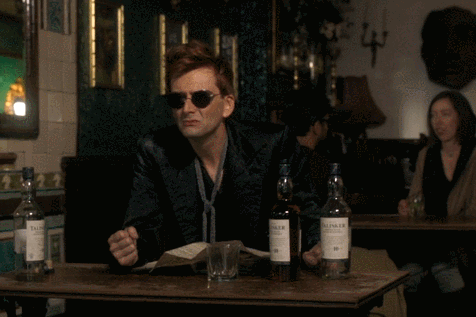
And since I'm nice [and because I fully understand the importance of saving people as much effort as possible to catch a larger audience - Duh 😇], here are the links for Part 1 and Part 2 🥰 so that everyone is on the same page as we dive into Part 3.
As I previously announced, we'll dissect our favorite pair's next two encounters today which are S1 3004 BC (Noa's Arch, The Flood) and S2 2500 BC (Job's ca-

[future me rereading this before dropping - Yep, nope, not happening just yet]
By doing that, I will try my best to prove to you the main point of my analysis I've revealed at the end of Part 2.
Repeat after me: Good Omens is a philosophical essay disguised as comedic/satyric/romantic fiction.
[Yeah... here she is, already giving orders strong recommendations... I'm so Metatroning you right now.]
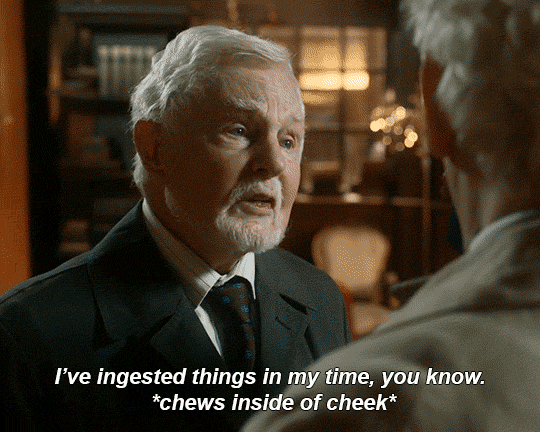
[And, since I'm at my best when I'm Metatroning people, this is the moment I'm gonna take to strongly recommend you to ingest the human matter of your choosing - Num num num.]
*In Crowley's voice* OOookaay, let's start!
3004 BC (Mesopotamia - Noa's Arch, The Flood)
In S1, Right before this encounter happens, the scene starts by making us, the audience, witness Aziraphale very badly lying to God about the flaming sword, an event that I already mentioned in part 2 because of the contrast it was considering he did tell the truth to a newly Demonized Crawley in comparison.
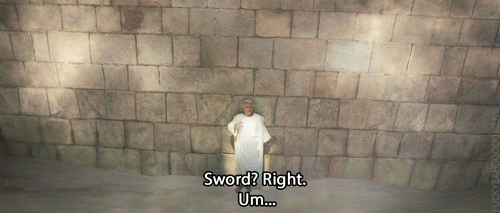
BUT [Yay, first "but" of Part 3! Are you having fun?], I really want to talk about this bit some more because that remains one of the scenes that, to this day, bugs me THE MOST in Good Omens as a whole.
To sum things up, you're telling me that GOD:
BOTHERED to pop in to ask one of their Angels a question.
That the said Angel seemed suuuuper anxious about from the start: looking everywhere aimlessly, almost asking them WHAT A DAMN SWORD EVEN WAS... basically giving away EVERY TELLTALE SIGN, both in their voice, mannerisms, and the simple fact that they were literally back to the wall, that they were about to LIE, proceeded to give God the UNanswerest answer EVER:
"Oh, must have, uh, must have put it down here somewhere."
And God just... just... LEFT THAT LYING ANGEL ALONE?! Just as quickly as they arrived?! No arguments, no further questions, no reckoning, just... NOTHING. HAPPENED?!
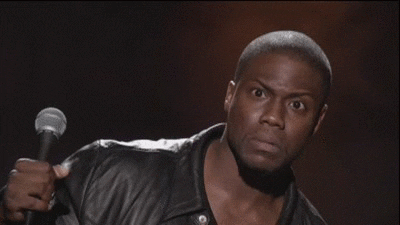
HUH?
WOT?!
WHO?!
WHO THE F DOES THAT?!
WHO DOES THAT?! That is a real question! WHO?!
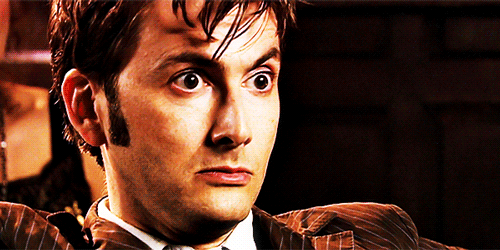
IT DOESN'T MAKE ANY. SENSE!
THE F-
I mea-
I'll never recover from it.
Oof. Okay, I'm fini-
I NEED an answer in Season 3! This is all I ask! I don't need the world to be saved, I don't need Alpha Centauri, man, I don't even need Aziracrow to reuni- [okay, no, can't say that, even if I like being dramatic, I take that back, this is all I want and all I've ever wanted, please, I just need to see Aziraphale in a white dress and Crowley demanding him to remove his 200 yo jacket on top of it because it "absolutely ruins it", please!] I. NEED. ANSWERS.
*clears her throat* Yeah. So. I'm perfectly fine with this scene. Moving on!
Aziraphale and Crawley meet in Mesopotamia during the year 3004 BC.
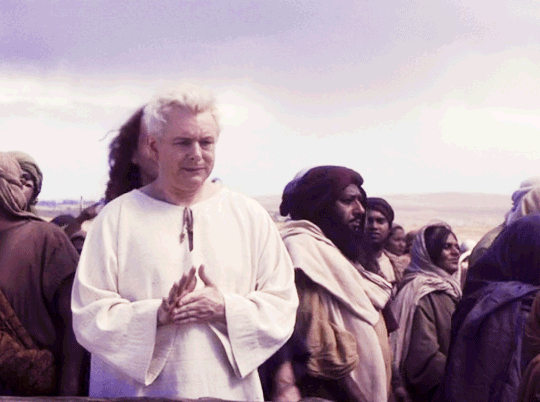
Crawley is the first to notice and to greet Aziraphale VERY enthusiastically. Which is, first of all, cute, but also an indicator that they haven't seen each other in a very long time, more precisely, since Eden (a thousand years prior to be exact). We know that because the first thing Crawley says after his "Hello, Aziraphale!" is the direct continuation of their conversation back in Eden:
"So, giving the mortals a flaming sword. How did that work out for you?"
Aziraphale answers what will never cease to bug me:
"The Almighty has never actually mentioned it again."
Which still peaks my interest because it could mean two things, and pretty different things at that:
One, God and Aziraphale never directly interacted again and nobody from the Main Office ever asked him about the flaming sword at all, which made Aziraphale believe that God never asked them anything about it.
OR
Two, God and Aziraphale DID directly interact again but the flaming sword subject has never been brought up once more.
Given the way this sentence is constructed and the emphasis on "actually mentioned it again," I'm more inclined to believe in the second option, which would be a very interesting thing to pounder:
Aziraphale might have a "privileged" relationship with God considering they probably interacted somewhat directly and more than once.
I'll go back to it later because we need to keep that in mind for the Job's case encounter.
Crawley says that it is "probably a good thing" until his attention is drawn to what is happening around them.
Then, they will debate the subject of the day, which is pretty much the same thing as before but formulated differently and condensed:
What is the point of Good and Bad? Do these concepts even have a meaning or not?
The main difference between the two previous encounters compared to this one is that this time, Aziraphale and Crawley are both active in the debate and do find common grounds here and there. It is shown cinematographically: they share the screen.
Aziraphale explains to Crawley that God got "a bit tetchy" and wants to drown the human race (well, at least the Middle Eastern humans) and Crawley takes that announcement astonishingly, which still aligns with his creator-at-heart persona.
"All of them?"
Insists Crawley.
Aziraphale first tries to mitigate what appears to Crawley as an extreme reaction by stating that Noah, his family, and their spouses will be spared but you can see that he, himself, doesn't really believe in what he tries to say.
"But they're drowning everybody else?"
Crawley really, really cannot comprehend what is happening.
"Not the kids. You can't kill kids."
This reminds us of their very first meeting because Crawley, here, judges God and tries to put himself in their place. Again.
Aziraphale answers with a worried nod: both because he is scared (his Fear of God cannot be anything but present at that moment) and because... he agrees.
And THEN, Crawley says that:
"Well, that's more the kind of thing you'd expect my lot to do."
Now that Aziraphale is more inclined to be part of the debate, Crawley tends to be more forthright about his opinion:
If God can do what Satan and his demons do, what is the point of separating the two? Are they, really, that different?
And, more so:
Is God a Good being anyway?
If Good or Bad exists, of course. [Oh, yes, I know I'm annoying. 100% aware. 😁]
To Aziraphale, it is clearly the case, and that is why he tries, again, to mitigate God's actions:
"The Almighty's going to put up a new thing, called a rainbow. As a promise not to drown everyone again."
A rainbow, huh? How interesting...
A rainbow is basically a demonstration of the union between Water and Fire. God and Satan. Good and Bad. Blah blah blah.
Almost as if...
Nahhh...
Almost as if they both needed to exist at all times!
Also, Aziraphale almost sounds like he is interpreting the rainbow as God's excuse for having a tantrum.
Which Crawley responds with a very sarcastic:
"How kind."
That's when Aziraphale cannot bring himself to follow Crawley's opinion any further (even if it is clearly shown he DOES agree, he is just SCARED to be).
After telling Crawley that he cannot judge God, that's when the "Ineffable" word is brought up again. This time, by Crawley. Because he already knows what Ineffable means to Aziraphale:
I am not important, or mighty enough to judge God and I am not supposed to. I am supposed to do what I am told, no questions asked.
Does it sound repetitive? Yeah, because it is 😅 That is Good Omen's main theme, after all.
This story is, as I mentioned before, a satire. Of religion, but also, of the concept of hierarchy, and the danger of ideologies as a whole. "Ineffable" is an ideology. "Ineffable" literally means "so emotionally overwhelming and powerful that you cannot translate into words"...
But Good Omens wants to bring you to ask yourself: cannot or don't want to?
Aziraphale is a character who doesn't want to think by himself because he is scared of a higher power (hierarchy). But he cannot just... stop thinking. Oppositely to Crowley, who kind of always, naturally had that ability.
Therefore, that makes it difficult for the both of them to understand each other [Oh yes, we'll talk about that further when we finally talk about that S2 finale that left us traumatized. According to my rhythm and how my Muse is an erratic bench, I'd say this conversation will occur in about a year or two.] Just as it is difficult for any of us to understand the people who think dramatically differently than us. Good Omens is an invitation to debate with people who do not share our views. That is how we stay open-minded and prompt to change.
Basically, folks: don't blindly stay in the boxes you're in.
Hierarchy is heavily criticized too, because it is a big cause - if not the main one - of people staying put in their respective boxes. Religion is a box among many others, hence the fact I prefer to say that GO mocks ideologies as a whole.
But hierarchy can be different things, and, more so, can use many different tones towards its subordinates: hierarchy can be nice, and affectionate (family, for instance - or not, definitely not always). Hierarchy can also be threatening, physically or mentally, or both (dictatorship, for instance).
Basically: hierarchy can either come from love or fear.
Or... well, both. That's how you get... propaganda? That is the most blatant example that came to my mind. We tend to associate love with good. We also tend to forget how often love has been used as a weapon.
Good and bad are...
[You know the end of the sentence, now, do you? If not, it means I haven't harassed you enough, so let me remind you]
Good and Bad are always mixed up. If they exist.
Anyway, I feel like I'm starting to digress.
.... Actually? I'm not done with that segment just yet.

[You right now.]
Hierarchy can also come from... habits. History. Some hierarchies that we are under today are still there because of how long they have been installed, but not really because they are that relevant anymore. I am not going to bring examples here because I do not want to offend anybody and because you are more than capable of interpreting this statement in a way that speaks to you.
We'll talk about this more when we'll reach the... Jim/Gabriel subject. [In about a year and a half.]
ANYWAY. Moving on to a lighter reflection:
Romantically speaking, Aziraphale remembers that encounter because Crawley displayed strong empathy and concern during that whole meeting.
He asked Aziraphale how he was after the flaming sword incident,
He could not comprehend how killing kids was okay,
He bothered to alert Noah about the escaping unicorn.
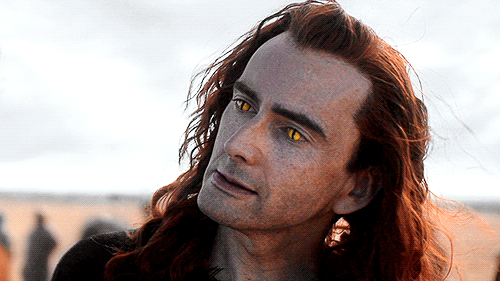
[Also, maybe, because damn - Also, it might come as a surprise to you who have seen me fangirling over Crowley for the last 3 parts but my favorite is actually Aziraphale 🤣]
After this conversation, The Flood starts and neither of them is protecting the other from it. Because of habits (after a thousand years spent on earth, they know this will not hurt any of them), but also as a way to tell us, the audience: they have started to realize they were in this together.
[Insert the "We're all in this together" Disney's High School Musical song right here... Yeah! I'm a Millennial, how could you possibly have guessed?!]
They are Equals.
Another really important topic in Good Omens, by the way, but it is time to dive into one of my favorite encounters between Aziraphale and Crowley and-
Huhhhh. I feel like analyzing two meetings including a whole episode in only one part might feel too heavy (to me, at least). So... I guess see you next time? 😅
Bye, Angels!

[No, no, I'm not saying you are "sssuckersss" okay? Just wanted a Crowley gif.]
Need help to find the rest of this analysis? I've got you covered! Follow me, Angel 😇
Previous - Beginning - Next
#Ineffable Husbands#Good Omens analysis#Good Omens#Good Omens S1#Good Omens S2#Aziraphale in love#Good Omens theory#Aziraphale#Crowley#Aziracrow#Effable the Ineffable#Philosophy#Good Omens is a philosophical essay disguised as comedic/satyric/romantic Fiction and I am here to prove it#What is Good what is Bad does it actually exists anyway#This analysis turns to 40% actual GO analysis VS 60% me digressing#I'm not sure I am mad about it though#Maybe you are? Idk#Can't wait to analyze the Job episode even if that alone will take over a month
46 notes
·
View notes